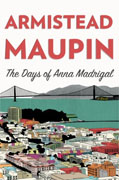The Days of Anna Madrigal
Armistead Maupin
book reviews:
· general fiction
· chick lit/romance
· sci-fi/fantasy
· graphic novels
· nonfiction
· audio books
· author interviews
· children's books @
curledupkids.com
· DVD reviews @
curledupdvd.com
newsletter
win books
buy online
links
home
for authors
& publishers
for reviewers

 |
The Days of Anna Madrigal Armistead Maupin Harper Hardcover 288 pages January 2014 |
|
In this final episode in the “Tales of the City” series, Maupin captures a time and place and mood with poetry, telling a funny, debauched, and sometimes crushingly sad story. Central to this tale is the aging Anna Madrigal, who is an archetype of sorts. As her story progresses, we learn much about her past as “scared-silly little Andy Ramsey,” at sixteen years old the lone male resident of the Blue Moon Lodge, and his blossoming love for the half Mexican. half Basque boy Lasko, whom he meets at Winnemucca’s Eagle Drug Store.
Infusing his work with intelligence, melancholy, and subtle, down-home humor, Maupin chronicles his beloved characters’ manifold charms. Anna is the anchor as she recalls a life of husbands and a daughter she found and then lost. While Anna prepares to return to Winnemucca to retrace her past with Brian, the most senior member of her brood ("the perennially roving bachelor of (good heavens, no) sixty-seven, had finally found someone worthy of a permanent cuddle"), Brian’s daughter, Shawna, aches to be a mother and decides that her insemination will take place at the Burning Man festival. Also on their way to the festival are Michael "Mouse" Tolliver and his husband, Ben. A long-term survivor of “the plague” that wiped out half of those from his past, Michael is constantly insecure. Maupin perfectly captures the aging psyche of an HIV-positive gay man. Michael is terrified that Ben will leave him, “his darkest fear masquerading in all its flippancy.” The story swivels around twin fulcrums. We follow Michael and Ben’s plans for Burning Man, a communal effort that soon becomes a grand adventure that will change their lives. Re-entering their orbit once again is beloved matriarch Anna, a woman of perpetual mystery who seemingly places her cards on the table and is aided by Brian to help her reconnect spiritually with long-lost Blue Moon Lodge. Maupin gives an unsentimental depiction of small rebellions in a town where everything falls apart. While the fate of Lasko remains at the heart of Anna’s journey, there’s also a light, fairy tale dusting that covers Winnemucca and its inhabitants, casting a spell that gently dislocates the reader's sense of what exactly is going on. Much of the action in the later half of the novel takes place at Burning Man, this huge, empty, desolate place where the wind always blows, covering everything and everyone with gray dust within seconds. Here Jake builds an art project that represents his love and respect for Anna. The large, interactive creation, like a giant butterfly, is one that people can touch and feel and will come to symbolize much of Anna’s life. The book traces the slow unfolding of Anna’s essential, contradictory self, her voyage into her past and her compelling infatuation with Lasko, a love unrequited at best yet heavy with passionate attachment. The couple soon become soulmates of sorts but are destined to remain apart. Part of Anna’s journey is that she is old and has abandoned space to someone new, someone young, so that she can die indifferent to her own decay and lost beauty. Anna’s rueful yet wise voice remains front and center in the novel, her incredible spirit simultaneously sinking and unsinkable, happily dominating much of the action. At the novel’s conclusion, Anna’s thoughts return to the theme of how old makes way for the new. For Anna, sorrow feels an afterthought, like something not quite finished—questions not quite resolved, life just moving on without providing a neat ending. With broad humor and a talent for the inanities of modern life, Maupin is perhaps saying that youth, which over the years sometimes grows decrepit, is replaced by something far wiser and a new, steady form of love. Originally published on Curled Up With A Good Book at www.curledup.com. © Michael Leonard, 2014 |
| Also by Armistead Maupin: |
|
|
|
 Click here to learn more about this month's sponsor! |
|
| fiction · sf/f · comic books · nonfiction · audio newsletter · free book contest · buy books online review index · links · · authors & publishers reviewers |
|
| site by ELBO Computing Resources, Inc. | |
 Gone are the days of 28 Barbary Lane and the desire for Anna to constantly “fit in.” At ninety-two, she has a “Zen letting-go of familiar pleasures.” She’s well aware of wanting to leave like a lady even though she still has much to live for. Anna’s daily life is assisted by Jake, who appears helplessly chameleonic, “forever blending in with his emotions.” A hint of rosewater and the smell of Lysol can instantly “genie-summons” the lurid events of Blue Moon Lodge: the soft consoling arms of Anna’s mother’s best friend, Margaret (“a genuine Swedish blond with cornflower-blue eyes”), and a radio romance with a long-lashed boy who danced in pirate pants.
Gone are the days of 28 Barbary Lane and the desire for Anna to constantly “fit in.” At ninety-two, she has a “Zen letting-go of familiar pleasures.” She’s well aware of wanting to leave like a lady even though she still has much to live for. Anna’s daily life is assisted by Jake, who appears helplessly chameleonic, “forever blending in with his emotions.” A hint of rosewater and the smell of Lysol can instantly “genie-summons” the lurid events of Blue Moon Lodge: the soft consoling arms of Anna’s mother’s best friend, Margaret (“a genuine Swedish blond with cornflower-blue eyes”), and a radio romance with a long-lashed boy who danced in pirate pants.